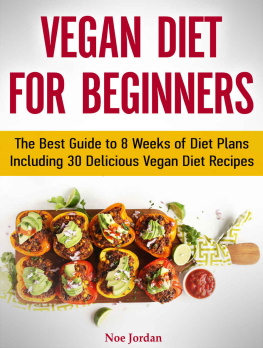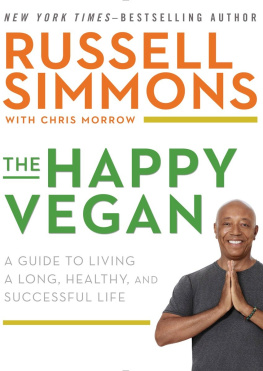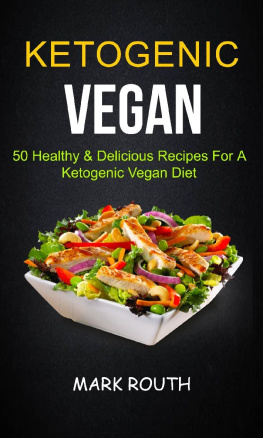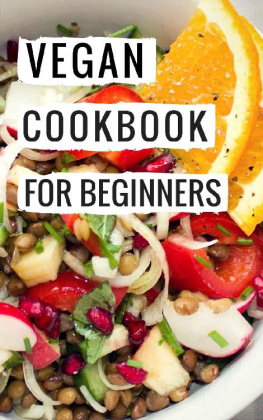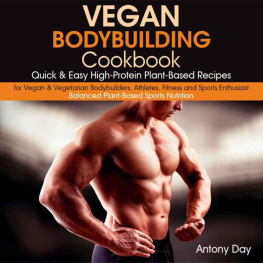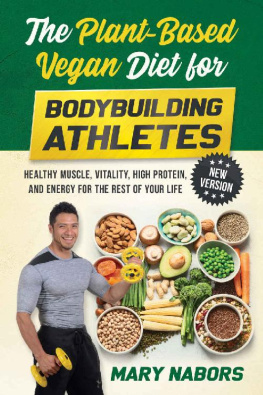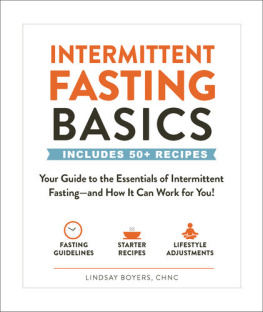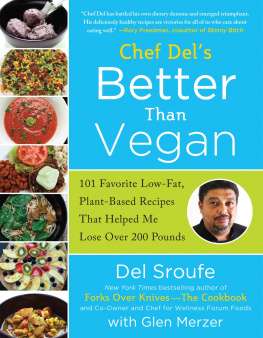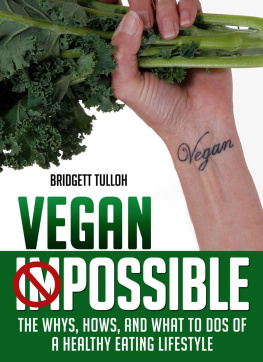As society changes, so does the dietary habits, and veganism is becoming increasingly popular.
INTRODUCTION
As society changes, so does the dietary habits, and veganism is becoming increasingly popular.
Choosing this way of life has many health benefits, and helps to protect animals and the environment. But for those who are just beginning to embark on veganism, it can seem a little overwhelming at first as you start to implement the necessary changes to your diet and lifestyle. Those who dont know any better tend to assume that being a vegan means you only consume vegetables, but this is certainly not the case. In fact, vegans can enjoy a wide and varied diet, and you definitely cant call the food boring! Its not just all salads and vegetables. Nowadays there are a lot of meat substitutes available, as well as alternatives for eggs and even ice cream! Learning the basics of veganism is the first step, and then it is simple from there on in. Knowing what you can eat and how to prepare it is essential, and with more people following veganism than ever before, it is even easier to find fantastic recipes to cook and meal plans to follow.
This book contains an 8 week meal plan to help you on your way. And, to make it even easier for you, we have even included the recipes from the meal plan! In fact, there are 30 breakfast, lunch and dinner recipes for your enjoyment. This will help you plan ahead to keep you on track as you embark on this wonderful way of eating. There is a whole chapter devoted to recipes for breakfast, lunch and dinner, and as a special bonus, another chapter all about sweet treats. A lot of people think vegan desserts are just going to be about fruit, but that is definitely not true. By using substitutes, you can have brownies, cheesecake, sticky toffee pudding and chocolate mousse, without breaking your diet.
And dont miss the chapter on yummy vegan snacks either! Everything about the vegan diet is simple, nutritious and tasty!
CHAPTER 1 VEGAN BASICS
As you should know, a vegan does not eat any animal products, poultry or fish. This means no meat, no dairy products, honey and no eggs. But its not just about diet either. Vegans also do not use any products that come from animals such as leather, silk, fur, wool, soaps and cosmetics. While its not too difficult to steer clear of the material animal products, it can be difficult to find foods that are appropriate at first when you are initially embarking on a vegan diet. Because meat and dairy products arent consumed, its very important for vegans to keep a close eye on their nutritional intake.
There are vitamins, minerals and other nutritional elements that can become lacking in a vegan diet, so you need to know how to keep your levels of these at a healthy range.
Protein
This is perhaps the most major difference in a vegan diet, as most people get their main source of protein from meat. Most foods do contain smaller amounts of protein, so by including these foods in your daily intake and by keeping your diet varied, you should be able to keep your protein level in check. Good sources of protein include chickpeas, tofu, lentils, peanut butter, almonds, spinach, whole wheat bread, potatoes and rice, amongst many others.
Vitamin D
This particular vitamin is generally not found in a vegan diet. However, the human body can produce its own supply of vitamin D through sun exposure.
All it takes it 15 minutes of sunshine on the face and hands a few times a week to ensure the production of vitamin D. Always wear sun protection though, as its important you dont get sunburnt! In winter months when the sun isnt around as much, it is possible to find vitamin D-fortified soy milk.
Fat
A good aspect of the vegan diet is the lack of cholesterol and low amounts of saturated fat, which both contribute to serious health problems and diseases. It is important to include some high-fat foods in your diet however, but in small amounts. These foods include margarine, nut butters, seed butters, nuts, avocado, coconut and oils.
Calcium
Normally we get the bulk of our calcium from dairy products.
For the vegan diet, good sources of calcium include tofu, dark green vegetables, orange juice and fortified soy milk.
Iron
Iron is essential for health, and is found in red meat and green leafy vegetables. Because you are no longer consuming meat, you need to increase your intake of these vegetables. In some cases, a supplement may be needed.
Zinc
The vegan diet includes foods that have a good level of zinc, such as legumes, nuts and grains, so most people would have a daily intake that is near to the recommended daily intake.
Omega-3 Fatty Acids
Without fish in the diet, an alternative source of omega-3 fatty acids is important.
Good examples include canola oil, flaxseed and flaxseed oil, soybeans, tofu, and walnuts.
Vitamin B12
Vitamin B12 is important for energy and folate levels, and many people on an ordinary diet tend to develop a deficiency as they get older. There are not a lot of foods in a vegan diet that supply this vitamin, but it can be found in nutritional yeast. If a deficiency occurs, it can lead to an anemia, resulting in tiredness, constipation, weakness, weight loss, anorexia, depression and painful nerve problems. The treatment for this is usually a series of injections, but in some cases, hospitalization and treatment may be necessary. To avoid this, it is easier to take a B12 supplement, to ensure your B12 is always at a healthy level.

